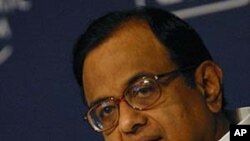A delegation of Indian lawmakers has visited Indian-controlled Kashmir to explore ways of ending unrest in the troubled region, where more than 100 people have been killed in anti-India protests. But prominent separatist leaders in the Kashmir valley refused to hold official talks with the delegation.
Led by India's Home Minister P. Chidambaram, the lawmakers drove through heavily guarded, deserted streets in Kashmir's summer capital, Srinagar, which was under tight curfew for the eighth straight day.
The delegation represents all major national parties. Its mission is to evolve a political consensus on how to calm a region where growing demands for freedom from Indian rule have led to waves of protests, and deadly confrontations between security forces and residents.
More protests were witnessed on Monday near the town of Sopore, where a woman had been killed in firing by security forces on Sunday.
Home Minister P. Chidambaram struck a note of conciliation saying he wanted to know what Kashmiri leaders think needs to be done to end the unrest. "We are here to listen to your views. We will give you a patient hearing," Chidambaram said.
The delegation held talks with representatives of pro-India parties in Kashmir, who urged more autonomy for the region.
But the biggest separatist alliance in the Kashmir valley, the Huriyat Conference, refused to meet the delegation. Huriyat leader, Mirwaiz Umar Farooq, called the visit a "farce", saying that curfews have converted much of Kashmir into a jail.
Farooq slammed the Indian government as "undemocratic" for putting most Huriyat leaders under house arrest while at the same time inviting them for talks. "The façade of dialogue they are creating ... and trying to give the impression government of India is very serious," he says, "they are absolutely not serious at all."
But a handful of lawmakers reached out to key separatist leaders by meeting them at their homes.
In one such meeting, a hardline separatist leader, Syed Ali Shah Geelani, warned that normalcy will not return to Kashmir until New Delhi accepts that it is a disputed region.
The Huriyat alliance struck a more moderate note. It sent a memorandum to the delegation saying it is willing to engage in dialogue to find a solution to the Kashmir dispute that is acceptable to India, Pakistan and the people of Kashmir.
Kashmir is divided between India and Pakistan. While some separatist leaders favor independence from India, others want it joined with Pakistan.
On Tuesday, the delegation will travel to Jammu, the predominantly Hindu region in the Jammu and Kashmir state.
Delegation of Indian Lawmakers Visits Indian Kashmir




